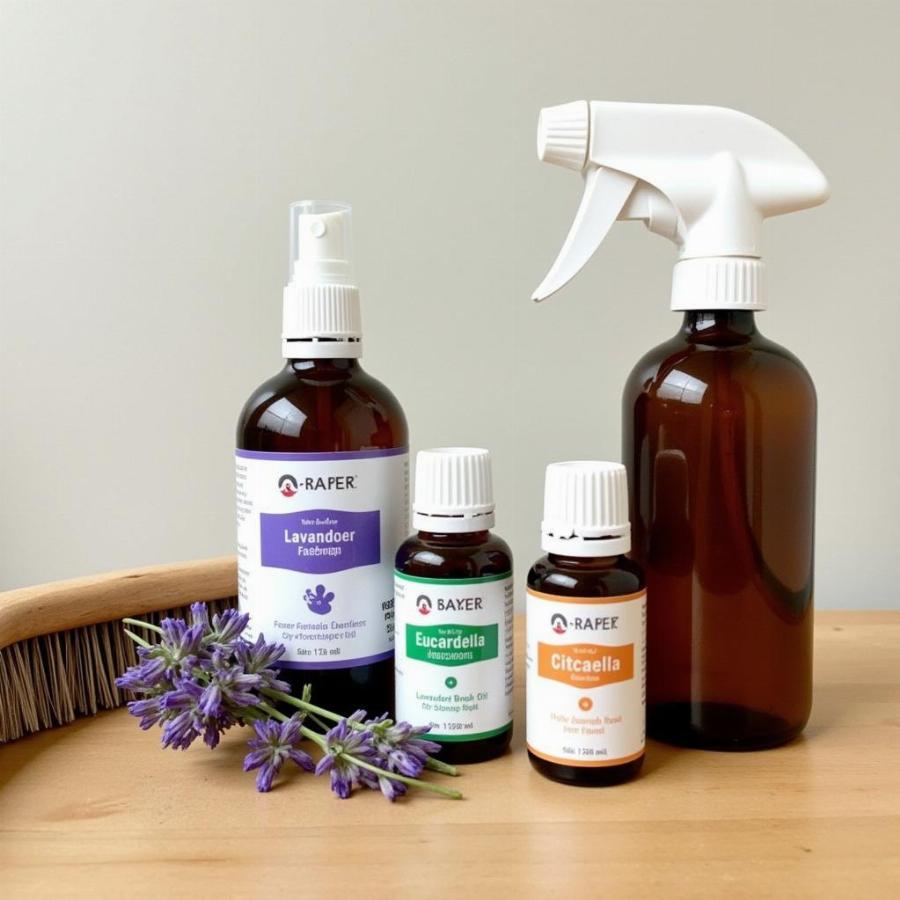Flies on dogs can be a real nuisance, causing irritation, discomfort, and even health problems. Finding the right repellent for flies on dogs is crucial for protecting your furry friend from these pesky insects. This article will delve into the various options available, discuss their effectiveness, and help you choose the best solution for your dog’s specific needs. We’ll explore natural remedies, commercial products, and preventative measures to ensure your dog stays fly-free and happy all year round.
Understanding the Fly Problem on Dogs
Why are flies so attracted to dogs? Several factors contribute to this, including the scent of their fur, any open wounds or sores, and even their food. Certain breeds with folded skin, like Bulldogs and Shar Peis, are particularly susceptible as flies can breed in the warm, moist folds.
Types of Flies Affecting Dogs
Different types of flies can bother dogs, each posing unique challenges:
- House Flies: These common pests are attracted to dog waste and can transmit diseases.
- Stable Flies: Known for their painful bites, stable flies often target a dog’s legs and ears.
- Black Flies: These tiny flies can swarm and cause intense itching and irritation. They often bite around the face and ears. You can learn more about this specific issue in our article on black flies biting dogs.
- Blow Flies: These flies are attracted to decaying organic matter, including open wounds on dogs.
Natural Repellents for Flies on Dogs
Many pet owners prefer natural solutions to protect their dogs from flies. Here are some effective natural repellent options:
- Apple Cider Vinegar: Diluted apple cider vinegar can be sprayed on a dog’s coat to deter flies. Its strong scent acts as a natural repellent.
- Essential Oils: Certain essential oils, like lavender, citronella, and eucalyptus, can repel flies. However, it’s crucial to dilute them properly and avoid contact with the eyes, nose, and mouth. Always consult with a veterinarian before using essential oils on your dog.
- Herbs: Herbs like basil, mint, and rosemary can be planted around your yard to naturally repel flies.
Are Natural Repellents Effective?
While natural repellents can be effective for some dogs, their potency can vary. They may need to be reapplied frequently, especially in areas with high fly populations.  Tinh dầu thiên nhiên đuổi ruồi cho chó
Tinh dầu thiên nhiên đuổi ruồi cho chó
Commercial Fly Repellents for Dogs
A wide range of commercial fly repellents are available for dogs, including sprays, wipes, and spot-on treatments. Look for products containing pyrethrins or permethrins, which are effective insecticides. However, be cautious when using permethrin products on cats, as they can be toxic. Always choose a product specifically designed for dogs and follow the instructions carefully. You can find more information about effective fly repellents on our page dedicated to the best fly repellent for dogs.
How to Choose the Right Commercial Repellent
When choosing a commercial repellent for flies on dogs, consider factors such as your dog’s age, size, and health condition. If your dog has sensitive skin, opt for a hypoallergenic formula. Read reviews and compare different products to find the best fit for your furry companion.
Preventing Flies on Dogs
Prevention is key to keeping flies away from your dog. Here are some preventative measures you can take:
- Proper Waste Management: Regularly clean up dog waste in your yard to eliminate breeding grounds for flies.
- Maintain Cleanliness: Keep your dog’s bedding, food bowls, and surrounding areas clean and free of debris. This reduces the attractants that draw flies.
- Grooming: Regular grooming can help prevent matting and skin irritations that can attract flies.
Conclusion
Dealing with flies on dogs can be frustrating, but with the right approach, you can effectively keep these pesky insects at bay. By understanding the various types of flies, exploring natural and commercial repellents, and implementing preventative measures, you can ensure your dog remains comfortable and protected. Remember to always prioritize your dog’s safety and consult with a veterinarian if you have any concerns. Implementing these strategies will contribute to a happier, healthier life for your beloved canine companion, keeping them fly-free and ready to enjoy every moment.
FAQ
- What is the safest fly repellent for dogs? Natural repellents like diluted apple cider vinegar are generally considered safe. However, always consult a vet before using essential oils.
- How often should I apply fly repellent on my dog? The frequency of application depends on the product. Follow the manufacturer’s instructions.
- Can flies harm my dog? Besides being annoying, flies can transmit diseases and cause skin irritation.
- Are there any home remedies for fly bites on dogs? A cool compress can soothe the irritation from fly bites.
- What should I do if my dog has an allergic reaction to a fly repellent? Immediately discontinue use and consult a veterinarian.
- Can I use human fly repellent on my dog? Never use human fly repellent on dogs. Many contain ingredients that are toxic to them.
- Do dogs eat bugs? While it’s normal for dogs to occasionally eat bugs, some insects can be harmful. Learn more about this in our article: do dogs eat bugs.
More Helpful Resources
- How to keep flies off your dog during outdoor activities: how to keep flies off dogs
- What if my dog eats bugs? should dogs eat bugs
Beaut Dogs: Your Trusted Source for Canine Care
Beaut Dogs is committed to providing dog owners with comprehensive and reliable information to help them provide the best possible care for their canine companions. We offer a wealth of resources on various topics, including breed information, health and wellness, training, and nutrition. When you need support, please contact us at Email: [email protected] for detailed and accurate answers from Beaut Dogs.